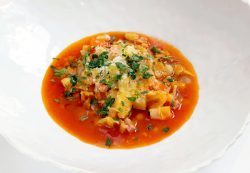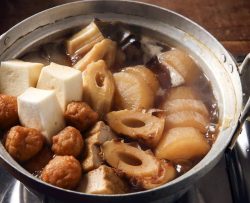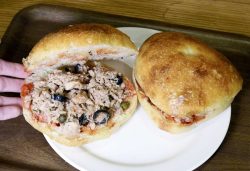Quick Freeze Tech Gaining Popularity in Japan’s Restaurant Industry; Improved Quick Freezers Prevent Food from Losing Flavor
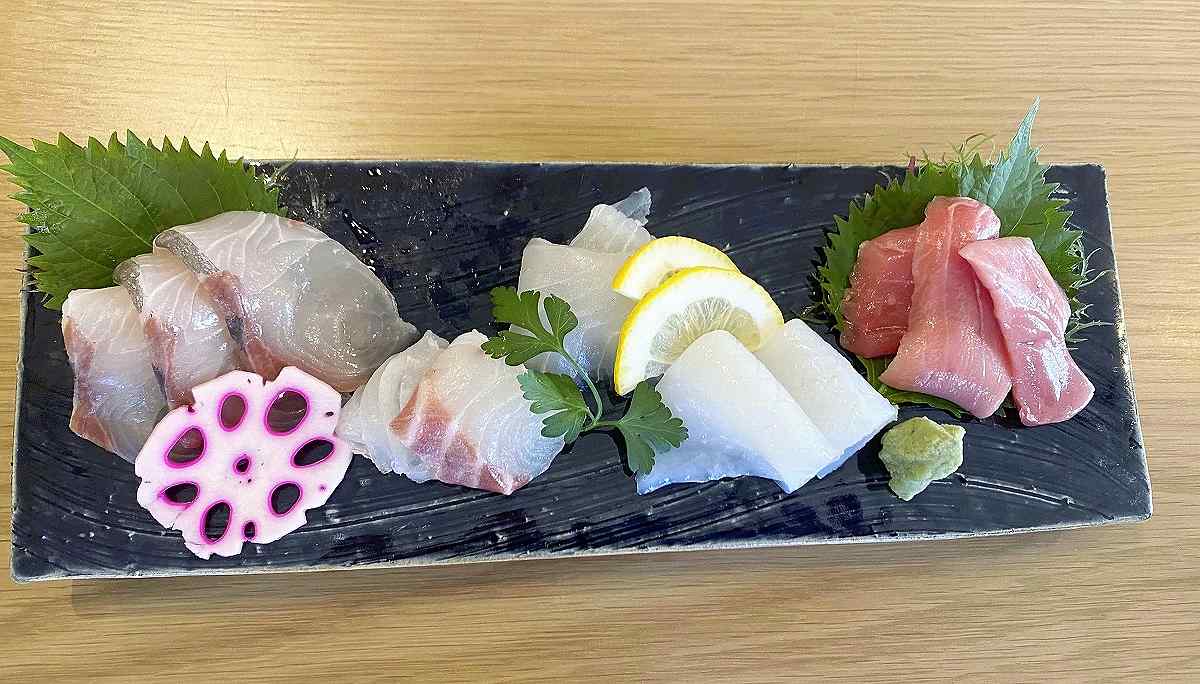
Assorted thawed sashimi at the eatery
12:00 JST, October 6, 2024
FUKUOKA — As labor shortages become more serious in the restaurant industry, the use of food freezing methods is spreading. Frozen food only needs to be thawed before being served, making it possible for restaurants to run with fewer staff.
Technological advances are helping prevent frozen food from losing its flavor when thawed. Since freezing methods make it possible to preserve food for a long time, expectations are high that it will also help cut back on food waste.
One afternoon in late July, a woman was enjoying pasta during lunch time at Bar Kodamari in Fukuoka. Her dish was originally a frozen meal.
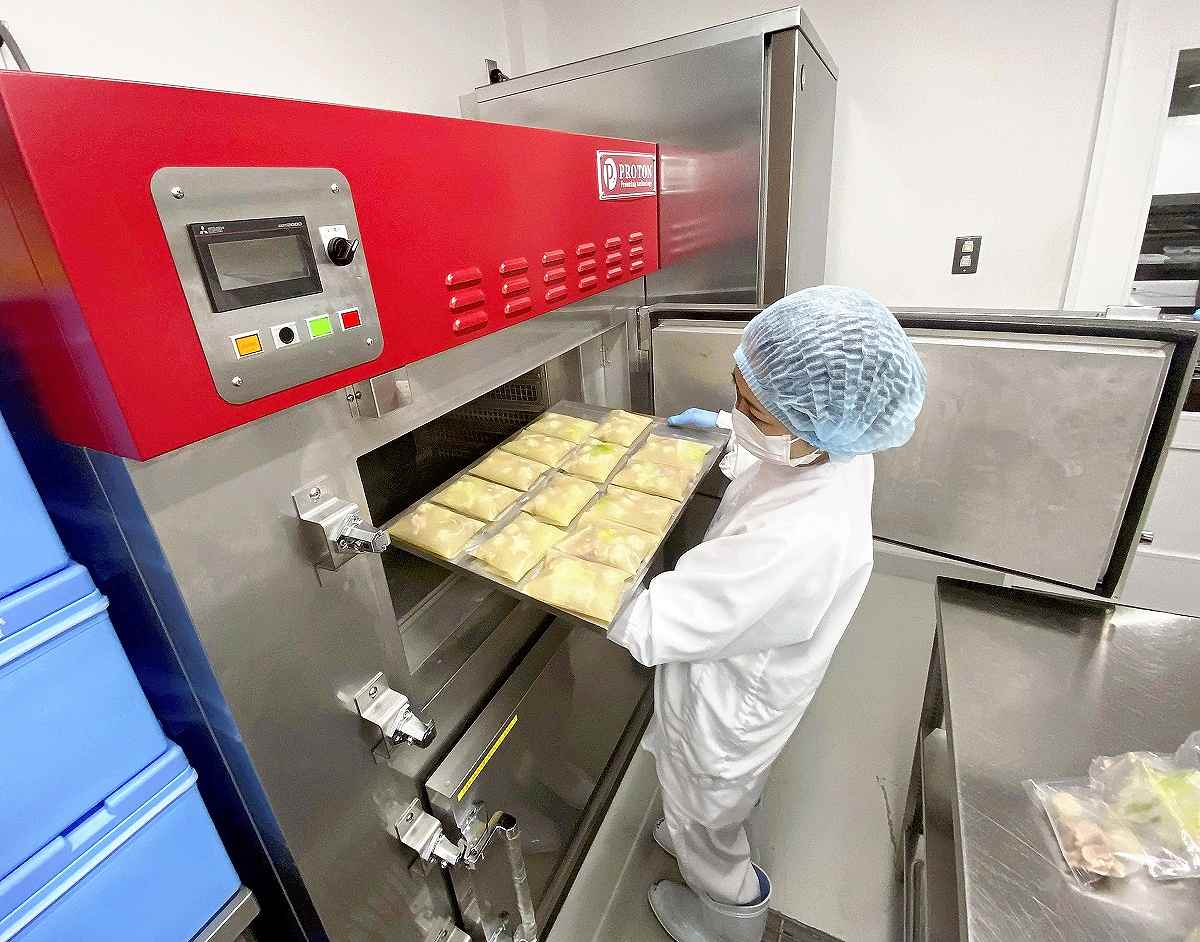
An employee places packaged food into a large quick freezer at a food processing plant on the premises of Bar Kodamari in Fukuoka.
Bar Kodamari has a food processing facility on its premises that prepares and freezes meals. The dish is defrosted as soon as a customer orders it. The eatery’s menu includes time-consuming dishes like carpaccio chicken breast fillets, priced at ¥1,000, and acqua pazza sea bream and asari clams for ¥1,200.
“Almost all the dishes on our menu are frozen, which is rare in Japan,” said Kingo Terakawa, president of OBU Company Inc. in Chikushino, Fukuoka Prefecture, which runs the restaurant.
Since opening in August last year, the restaurant has been well received, with customers saying the food doesn’t taste like it has been frozen.
There is no need for a cook as the food simply needs to be heated in a microwave, boiled in hot water or defrosted naturally. The eatery does not have much food waste and enjoys high margins.
OBU has already opened a sister restaurant, Kodamari Shokudo, in Mizuho PayPay Dome Fukuoka that serves dishes including seafood rice bowls. The company aims to run more eateries using this cooking style in the future.
Freezing at a faster speed
Traditionally, restaurants used to be less likely to use frozen foods as they placed emphasis on the taste of freshly cooked food. But the situation has changed drastically due to labor shortages.
Tokyo-based Micreed Co., a major wholesaler of frozen food for businesses, posted ¥5.9 billion in record sales for the fiscal year ending in March 2024. The company, listed on the Tokyo Stock Exchange Growth Market, said the number of new customers increased by about 50% during the April-June period compared to the same period last year.
Improved refrigeration technology is also encouraging restaurants to use frozen food.
Meat, fish and vegetables, as well as other food products, are said to lose their flavor when kept at temperatures between minus 1 C and minus 5 C for a long time since ice crystals within the food become larger and destroy cells. The key lies in how quickly food can be frozen at minus 6 C or lower, with technology developing toward that goal.
Dhowa Technos Co., an electrical equipment trading firm in Kitakyushu, launched a quick freezer in 2021 that rapidly freezes prepackaged foods by immersing them in a liquid at minus 35 C and shaking them vigorously. Inquiries are increasing for the product, which freezes food four times faster than conventional models, according to the company.
Issa is a startup in Kurume, Fukuoka Prefecture, that provides cooking services using air-cooled quick freezers. The number of inquiries Issa received for its business more than doubled compared to before the COVID-19 pandemic.
“Using frozen foods will become the standard in the restaurant industry in the future,” said President Naoki Ura.
Household market
Technological advances have also led to frozen foods tasting better in the household market.
Nishiki Co., a shrimp aquaculture company in Hofu, Yamaguchi Prefecture, purchased a quick freezer from Dhowa two years ago. The firm ships live shrimp, but began freezing some of them, making it possible to sell them year-round.
President Norihiko Yasumura said the frozen shrimp mostly keep their firm texture after being thawed. “We want to export them, too,” Yasumura said.
Family restaurant chain operator Royal Holdings Co. began selling Royal Deli frozen meals prepared using quick-freezing technology in 2019 to bring the taste of its restaurants to homes. The company currently offers about 50 kinds of frozen dishes.
According to the Japan Frozen Food Association, the annual per capita consumption of frozen foods was 23.2 kilograms in 2023, about 20% higher than 20 years ago, when it was 18.8 kilograms. The amount is likely to continue increasing as frozen meals expand to restaurants.
Top Articles in Features
-

Tokyo’s New Record-Breaking Fountain Named ‘Tokyo Aqua Symphony’
-

Sapporo Snow Festival Opens with 210 Snow and Ice Sculptures at 3 Venues in Hokkaido, Features Huge Dogu
-

Tourists Flock to Ice Dome Lodge at Resort in Hokkaido, Japan; Facility Invites Visitors to Sleep on Beds Made of Ice
-

High-Hydration Bread on the Rise, Seeing Increase in Specialty Shops, Recipe Searches
-

Heirs to Kyoto Talent: Craftsman Works to Keep Tradition of ‘Kinran’ Brocade Alive Through Initiatives, New Creations
JN ACCESS RANKING
-

Japan PM Takaichi’s Cabinet Resigns en Masse
-

Japan Institute to Use Domestic Commercial Optical Lattice Clock to Set Japan Standard Time
-

Israeli Ambassador to Japan Speaks about Japan’s Role in the Reconstruction of Gaza
-

Man Infected with Measles Reportedly Dined at Restaurant in Tokyo Station
-

Videos Plagiarized, Reposted with False Subtitles Claiming ‘Ryukyu Belongs to China’; Anti-China False Information Also Posted in Japan


